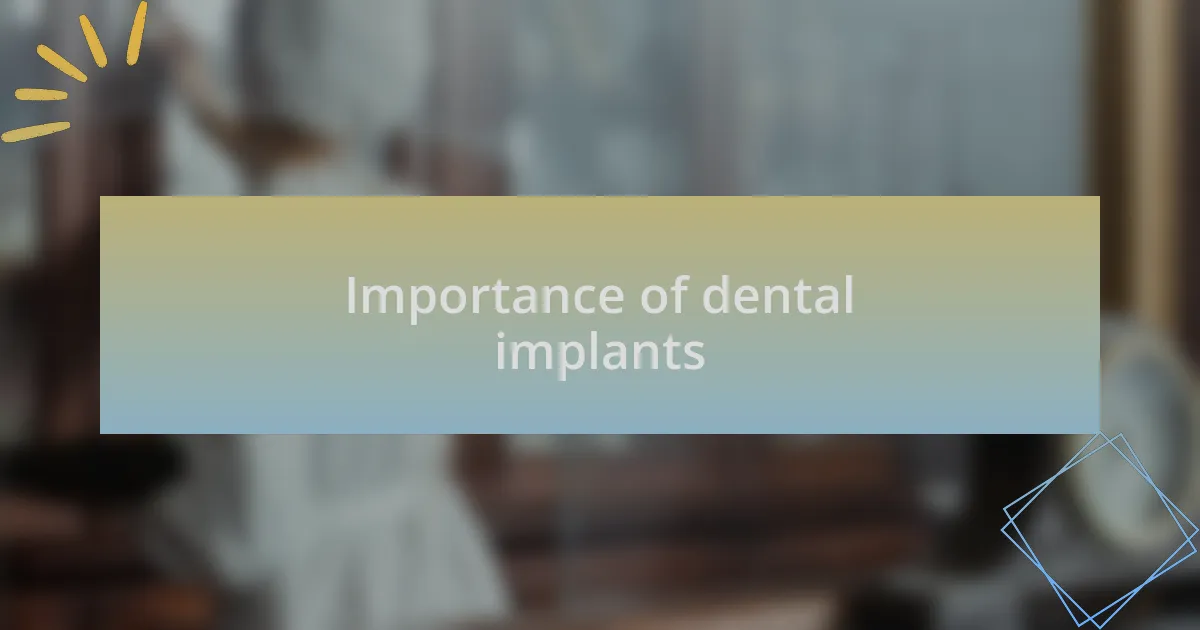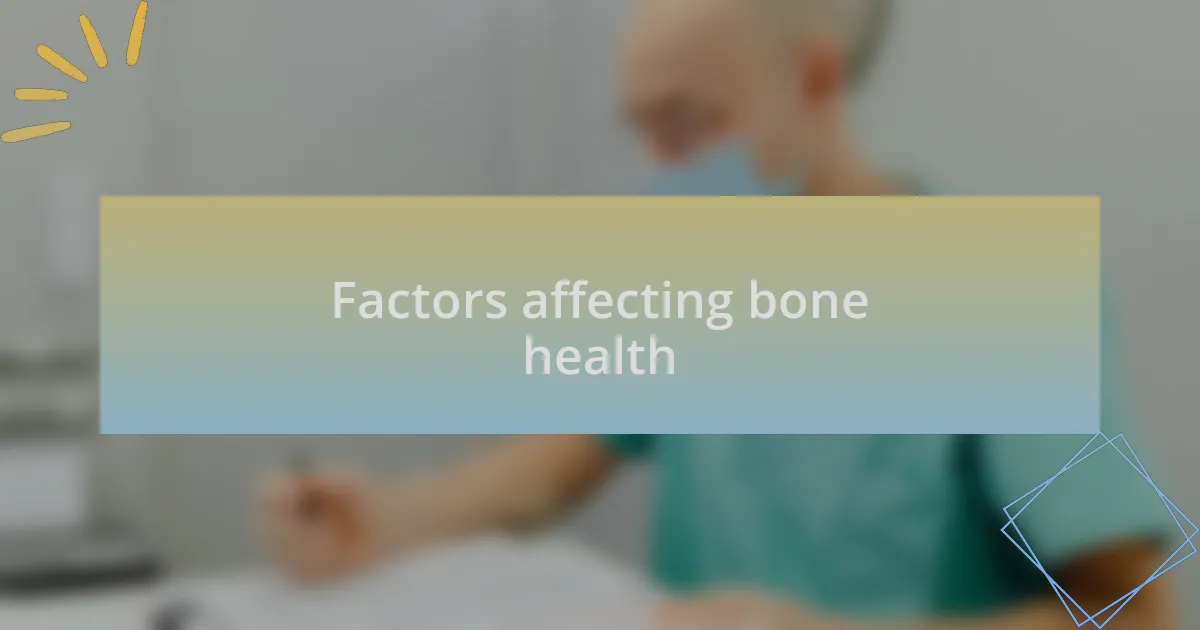Key takeaways:
- Good bone health is crucial for dental implant success, influencing healing and overall oral health.
- Dental implants not only enhance aesthetics but also prevent bone loss and improve quality of life.
- Nutritional factors like calcium, vitamin D, and protein are vital for maintaining strong bones.
- Incorporating strength training and healthy lifestyle choices can significantly enhance bone health.

Understanding bone health benefits
Good bone health is essential for anyone considering dental implants. From my own experience, I can say that having a strong bone foundation not only supports the implants better but also promotes overall dental stability. Isn’t it fascinating how our bone density plays a pivotal role in long-term oral health?
When I learned about the importance of bone health, I realized how much it impacts not just the implants, but the body’s ability to heal. Maintaining healthy bones means you’re gearing up for a smoother recovery process. Have you ever noticed how people who prioritize their bone health tend to have more vibrant, confident smiles?
Incorporating exercises that strengthen bones can truly lead to significant benefits. I remember discussing this with a friend who improved her bone density through simple weight-bearing activities. It’s remarkable how such small changes can create a substantial difference in dental outcomes and overall well-being. How are you taking care of your bone health today?

Importance of dental implants
Dental implants serve as a life-changing solution for many individuals missing teeth. From my own perspective, I’ve seen firsthand how they can boost confidence and improve functionality when eating or speaking. Do you remember a time when you felt self-conscious about your smile? Dental implants can restore that lost joy and allow you to reclaim your everyday interactions without hesitation.
The significance of dental implants extends beyond aesthetics. Personally, I once met someone who had struggled with chronic discomfort due to missing teeth. After receiving implants, not only did their pain diminish, but their overall quality of life improved remarkably. Isn’t it incredible how addressing tooth loss can impact one’s mental health and social life?
Moreover, I believe that dental implants contribute to long-term oral health by preventing bone loss. I’ve often thought about the connection between tooth roots and jawbone integrity. When a tooth is lost, the underlying bone can start to deteriorate. Implants mimic natural tooth roots, promoting bone growth. Have you ever considered how something as small as an implant could make such a significant difference in one’s oral health journey?

Factors affecting bone health
Bone health is influenced by a variety of factors that can significantly impact the success of dental implants. For instance, I’ve learned that nutrition plays a vital role; calcium and vitamin D are essential for maintaining strong bones. Have you ever considered how your diet might influence not just your overall health, but also the strength of your jawbone?
Another critical factor is age. As we grow older, bone density tends to decrease, which can complicate the healing process after implants. I remember discussing this with a patient in her late sixties who was hesitant to move forward with implants. It was important to highlight how advances in technology now allow for successful outcomes, even with age-related bone changes.
Additionally, lifestyle choices like smoking and alcohol consumption can hinder bone health. I once encountered a patient who, despite a strong desire for dental implants, struggled with bone loss due to smoking. It was a stark reminder of how our habits can shape our dental future. Have you thought about how your lifestyle may affect your decision to pursue implants? Each choice can have a ripple effect on bone health and overall dental success.

Signs of poor bone health
It’s fascinating how the body communicates when something is off, especially concerning bone health. One telltale sign is a noticeable increase in tooth mobility. I recall a patient who was alarmed when her teeth felt loose; it turned out her jawbone had been gradually deteriorating. Have you ever experienced that unsettling feeling? It often indicates that the foundation for your teeth is weakening, signaling that it might be time to seek professional advice.
Another sign to look out for is persistent pain or discomfort in the jaw. I remember a patient who had been ignoring intermittent pain, attributing it to stress. However, after a thorough examination, we discovered significant bone loss. It was a wake-up call for both of us—the body’s signals shouldn’t be overlooked. Have you been tuning into your body’s messages?
In some cases, you might notice that your dental implants or existing crowns feel different or cause discomfort over time. I had a patient once who shared her concern that her implant felt “off.” After digging deeper, we found that the underlying bone health was not optimal. This highlights how our oral health can be closely linked to bone integrity. I often encourage my patients to stay alert and proactive, as these signs can make a world of difference in maintaining a healthy smile.

Dietary influences on bone health
Diet plays a crucial role in maintaining healthy bones, and I’ve seen firsthand the impact of nutrition on my patients’ oral health. For instance, I had a patient whose diet was low in calcium and vitamin D. After discussing the importance of including dairy and leafy greens, they noticed an improvement in both their bone density and overall well-being. Have you ever considered how your daily meals could shape the health of your bones?
Another essential nutrient is protein, which supports the body’s cellular structure, including bones. I recall working with an athlete whose bone health was declining despite their active lifestyle. Together, we identified that their protein intake was insufficient. After adjusting their diet to include more lean meats, legumes, and nuts, their bone strength improved remarkably. Isn’t it interesting how sometimes small changes can yield significant results?
Lastly, I often emphasize the importance of healthy fats, especially omega-3 fatty acids, in bone health. One of my patients started incorporating fish and flaxseeds into their diet after our discussion. Not only did they feel more energized, but their bone density also showed signs of improvement during follow-up scans. Have you thought about how varying your dietary fats might benefit your bone health? It’s all interconnected, and I find that educating my patients on this topic often leads to empowering dietary choices.

Personal experiences in bone health
I’ve always been intrigued by how our lives shape our bone health. A while back, I faced a personal challenge when I experienced a minor fracture. It was a wake-up call for me, prompting me to examine my routine. Through this experience, I deepened my understanding of the symbiotic relationship between consistent exercise and bone density. I realized that regular weight-bearing activities were not just beneficial; they were essential.
Another pivotal moment came when I attended a seminar on bone health. One speaker shared his journey of recovering from osteoporosis, which left a profound impact on me. His story of perseverance and the small lifestyle changes he made—like prioritizing calcium-rich foods and supplements—made me reflect on my own habits. Have I been neglecting my own bone health in the hustle of daily life? I noticed I had taken my bones for granted, but this experience reignited my commitment to proactive care.
There was also a time when I volunteered at a community health fair, offering bone density screenings. Meeting individuals who were unaware of their risks was eye-opening. One elderly lady shared how her life had changed since she began incorporating daily walking into her routine. Her joy was contagious. It was a reminder to me of the positive ripple effect that awareness and small changes can create in our lives. Have you engaged with your bone health journey yet? It’s never too late to start making informed choices.

Tips for improving bone health
One effective way to improve bone health that I’ve personally found useful is incorporating strength training into my weekly routine. I started small, using my body weight and gradually adding resistance. It was enlightening to see how my bones responded positively to these challenges. Have you thought about how just a few weightlifting sessions could transform your bone density?
Nutrition also plays a crucial role, as I discovered after closely monitoring my diet. Increasing my intake of vitamin D and calcium-rich foods, like leafy greens and dairy, has been beneficial. It reminded me of the moments spent experimenting with new recipes. Why not try creating a delicious spinach and cheese casserole? It could be a fun way to enjoy both taste and nutrition!
Lastly, staying active and mindful about lifestyle choices, like quitting smoking and limiting alcohol, can significantly impact bone health. I recall a friend who made those changes and saw remarkable improvements in her energy levels and overall well-being. Have you considered how these simple adjustments could make a difference in your life? It’s all about taking one step at a time.